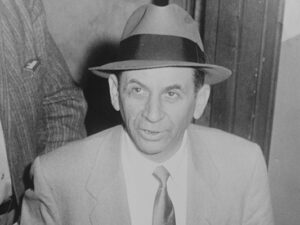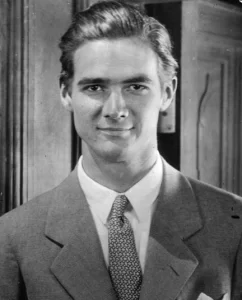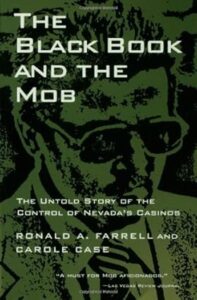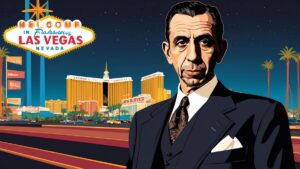Las Vegas is known worldwide as a hub of entertainment, luxury, and risk.
But beneath the glimmering lights and high-rolling tables lies a history far murkier than most tourists will ever realize.
While the popular narrative often centers around the Italian Mafia’s control over the city, deeper investigation reveals another, more complex story—one that ties the rise of Las Vegas to international politics, intelligence agencies, and powerful interests stretching from Washington to Tel Aviv.
Two groundbreaking books offer insight into this hidden history:
- The Money and the Power: The Making of Las Vegas and Its Hold on America by Sally Denton and Roger Morris,
- The Black Book and the Mob: The Untold Story of the Control of Nevada’s Casinos by Ronald A. Farrell and Carole Case.
Together, these works challenge the conventional wisdom about who really built and ran Las Vegas.
Meyer Lansky: The Syndicate Kingpin Behind the Scenes
Denton and Morris’s work focuses heavily on Meyer Lansky, the infamous Jewish mobster whose influence extended far beyond the casino floor.
While names like Bugsy Siegel and Tony “The Ant” Spilotro often grab headlines, it was Lansky’s criminal empire—subtle, strategic, and international—that played a central role in shaping the Las Vegas we know today.
The authors, both respected and credentialed (Morris served on Nixon’s National Security Council), argue that Lansky’s operations weren’t limited to profits from gambling.
His syndicate was deeply involved in covert financial operations, including laundering money for the CIA and advancing political interests favorable to the Zionist movement.
Importantly, this isn’t fringe speculation—the book was published by Vintage, a mainstream publishing house, and its authors are known for investigative integrity, not conspiracy mongering.

The CIA, Israel, and Casino Capital
One of the more startling claims in The Money and the Power is the extent to which the CIA used Las Vegas casinos as fronts for covert activity.
The Lansky syndicate, which had long standing connections with Israeli intelligence and organized crime networks, allegedly allowed the agency to launder funds through these casinos to support black ops and international meddling.
According to Denton and Morris, this arrangement was not an isolated incident but part of a longstanding entanglement between American intelligence and organized crime—a partnership rooted in shared geopolitical interests during the Cold War, especially those involving the Middle East.
Howard Hughes and the Illusion of a Clean Takeover
One of the most publicized events in Las Vegas history was billionaire Howard Hughes’ entry into the casino business in the late 1960s.
Hughes was widely believed to be “cleaning up” the mob influence in Vegas through massive property acquisitions.
However, Denton and Morris expose this as a well-orchestrated illusion.
While Hughes legally owned the casinos on paper, real control remained with Lansky’s people.
The same illegal skimming operations, money laundering, and syndicate activities continued under the guise of corporate ownership.
Hughes, whether knowingly or unknowingly, served as a front that placated public concerns while the real players stayed in power behind the scenes.

Bipartisan Political Connections to Organized Crime
The book doesn’t pull punches when it comes to naming names.
Denton and Morris trace the rise of Las Vegas not just through gangsters, but through politicians on both sides of the aisle who turned a blind eye—or worse.
Republican Senator Paul Laxalt of Nevada, a close ally of Ronald Reagan and once a potential vice-presidential candidate, is shown to have had troubling ties to Jewish crime figures linked to Lansky’s network.
But this was not a partisan issue.
Liberal Democratic Senator Hubert Humphrey of Minnesota, Lyndon Johnson’s vice president, is also implicated in cozy relationships with underworld interests.
In one particularly telling account, the authors describe how Lansky-connected Democratic Party machines across the country worked together to block anti-crime crusader Senator Estes Kefauver from securing the 1952 Democratic nomination.
Instead, they handed the nod to Adlai Stevenson, who, while not mob-affiliated himself, was seen as a safer political bet for their interests.
Selective Law Enforcement and Protected Interests
Another important work, The Black Book and the Mob, explores why certain criminal figures in Nevada faced heavy scrutiny while others seemed to operate with impunity.
Farrell and Case, both criminal justice professors at the University of Nevada-Las Vegas, highlight a stark disparity in law enforcement approaches.
Their research found that Italian mobsters were disproportionately targeted and persecuted, while many Jewish crime figures—often better connected politically—were left relatively undisturbed.
The authors suggest that fears of appearing anti-Semitic may have contributed to this imbalance, as did the growing political influence of pro-Israel advocacy groups during the mid-to-late 20th century.

Mormon Influence and Selective Tolerance in Nevada’s Casino Culture
Farrell and Case add a compelling cultural angle to the story.
They suggest that Nevada’s strong Mormon presence may have contributed to a subtle bias in how Jewish and Italian gangsters were perceived and treated by authorities.
According to the authors, “Mormons doctrinally identify with Jews,” which may have created a form of ideological affinity or unconscious favoritism.
As a result, Jewish figures involved in organized crime may have been shielded from the harsher judgments typically directed at outsiders.
Rather than facing widespread censure, many Jewish mob-connected figures not only avoided scrutiny but also gained significant stakes in the state’s gambling industry.

Not Just About Vegas: A Lens Into Global Power
What makes these books truly important isn’t just their documentation of criminal activity in Las Vegas, but the broader implications they raise about American power, media, and foreign policy.
Las Vegas, in this light, becomes a microcosm—a place where the interests of organized crime, intelligence agencies, corporate capital, and global politics all intersected.
This nexus of power was rarely held to account, operating behind closed doors while the public narrative focused on flashy mobsters and Hollywood-style stories.
As Denton and Morris argue, understanding the real history of Las Vegas is crucial to understanding how power operates in America. It’s not just about who controls the casinos—it’s about who controls the story.
Final Thoughts: Reading Between the Lines of History
For those willing to question the mainstream version of American history, The Money and the Power and The Black Book and the Mob are indispensable reads.
They offer not only an alternative history of Las Vegas but a revealing look into how influence, money, and politics are often inseparable.
Las Vegas was never just a playground.
It was, and in many ways still is, a battlefield for control—one where the house doesn’t just always win, but writes the rules of the game.
